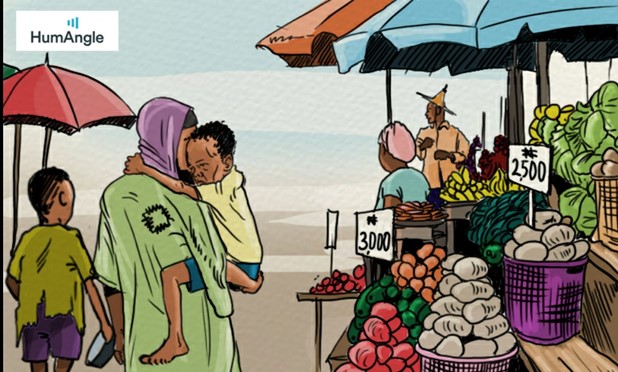Inflation: Nigerian Women, Children Most Affected By Cost Of Food Items

The increase in the prices of foodstuffs and other commodities has put Nigerian homes under intense pressure, especially against the background of the national economy entering a recession for the second time in five years.
So many families are unable to cope as the majority of people are living below the national minimum wage of N30,000 per month and businesses failing.
The devaluation of the naira has made things worse for many breadwinners who can no longer afford to feed their families three times a day as the prices of basic food items have skyrocketed in the past few months and the sources of income dwindling.
HumAngle interacted with some citizens in Kaduna on their experiences.
Maijidda Lawal, a mother of five who is the first wife of a meat seller, said that “things have been hard for us, we hardly get food to eat everyday. We can’t afford most foodstuffs in the market and it hurts me to see my children crying out of hunger.”
Maijidda started a trade of plaiting hair in order to support her family.
Hassana Aliyu a single mother of four children in Badarawa Ward of Kaduna North Local Government Area, said,” The hike in prices of foodstuffs has left an impact on my family.
‘Two of my children stopped going to school in order to support me by hawking on the roadside. I am not happy that they dropped out of school but I have no choice.
“My vegetable business is failing as people hardly patronise me due to a lack of money. It is a tough time for us.”
Nigeria’s recession and food inflation are threatening to cause nationwide hunger among the population, official records show.
Hajiya Nana, the Woman leader of a remote community in Kaduna, said,” Women are the caretakers of the home and the children. They are the ones left to cope with crying children and hunger. The effects of situations like these are mostly felt by women.”
Amina is an old woman with hearing disability and sells soup items for a living. Although with hearing impairment, she has mastered a way of communicating with her customers and sometimes uses people as translators.
Speaking on the effects of the inflation on sales, she said, “Nowadays I hardly earn N500 in a day unlike before when I usually earned N1,000 to N2,000 everyday. People are hungry yet have no money to buy foodstuffs.”
Maman Salima, a young mother of two in Rafin Guza community, said: “Our children are hungry and crying, the men go out everyday and it is a mother that feels the pain of her hungry children. We are helpless.”
The effects of hunger are numerous as it greatly affects a country’s productivity and economy. Hunger leads to an increase in malnutrition and diseases and death. Also, it causes an increase in crime.
Aisha, a nurse with a community health care centre, said: “Recently there has been an increase in the number of malnutrition cases due to hunger. The effects of hunger are numerous on children as it affects their physical and cognitive development.”
Support Our Journalism
There are millions of ordinary people affected by conflict in Africa whose stories are missing in the mainstream media. HumAngle is determined to tell those challenging and under-reported stories, hoping that the people impacted by these conflicts will find the safety and security they deserve.
To ensure that we continue to provide public service coverage, we have a small favour to ask you. We want you to be part of our journalistic endeavour by contributing a token to us.
Your donation will further promote a robust, free, and independent media.
Donate HereStay Closer To The Stories That Matter





Really saddening. The hike in prices is really not doing any good to most of the population.